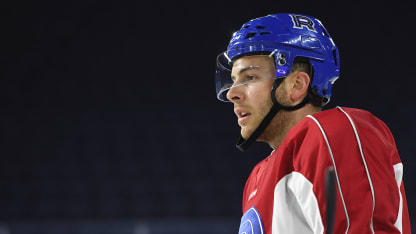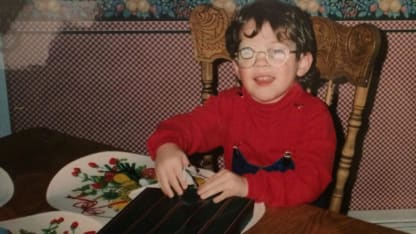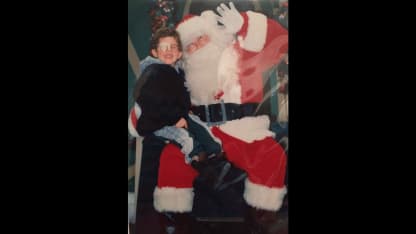Once he understood he had the talent to make a career out of hockey, the big question became whether he should keep his condition to himself, or leave it out in the open. Especially once he was drafted - the Blues picked him in the fourth round in 2011, 102nd overall.
"When I got to Junior, my dad told me not to talk about it, but I was thinking, 'This is who I am!'" he recounted. "I didn't consider myself to be handicapped compared to others, because I was always that way."
Still, he kept it a secret.
"When I got to the pro's, I remember at the start of Blues camp - the same thing happens in Montreal - where you have to read the letters from far, one by one, while the other players are waiting in line right next to you," remembered Veilleux. "The players were surprised to see that I couldn't see anything as soon as I covered my left eye, even on the second line. They were saying, 'Come on! Those are the big letters!' Other than that, it hasn't really affected me."
Veilleux asserts that his eye hasn't affected his game, either. If there is a difference, it's when he fights, because dropping the gloves is a part of his game. He admits that his mother isn't really happy about it, so when he's trading punches, he makes the effort to protect his right eye.
"The times when I was getting hit near the left eye, I would think to myself, 'I don't see out of that eye anyway!'" he cracked.
Despite it all, Veilleux does proceed with plenty of caution.
"That's why my visors are are bit thicker. A stick to the face wouldn't just change my career, it would change my life, too - be it for driving, going to work, anything," said Veilleux, who would've liked to have been a policeman if not for his vision. "So it's something I definitely have to pay attention to, but I don't think about it all the time.
Veilleux has also learned how to compensate for his reduced vision. But it all comes so naturally to him that he couldn't even say if he acts any differently on the ice - if he finds himself turning more to see better, for example.
"It's like a blind person who, at the end of the day, develops their other senses. But me, it's maybe been the same thing, because especially when I was younger, I really couldn't see as well. So it's maybe something I've developed without really being aware. But in hockey, we talk a lot on the ice," he concluded. "You learn to recognize the voices and to trust your teammates."





